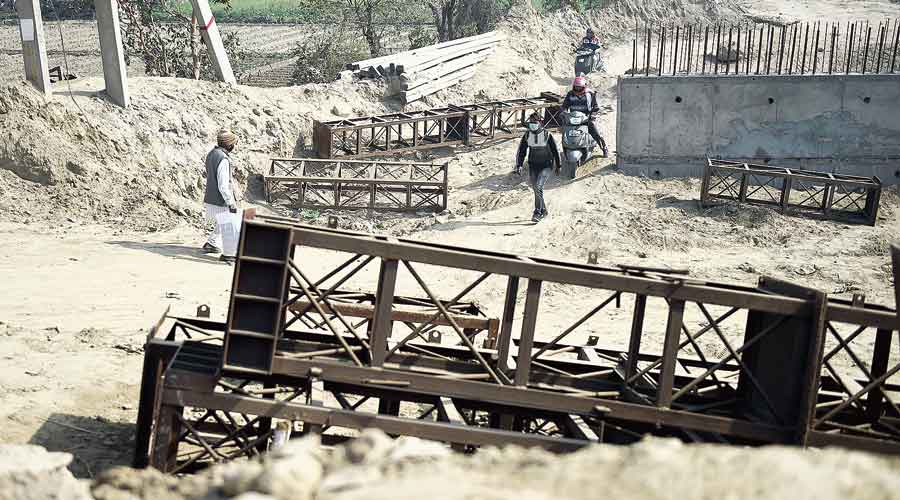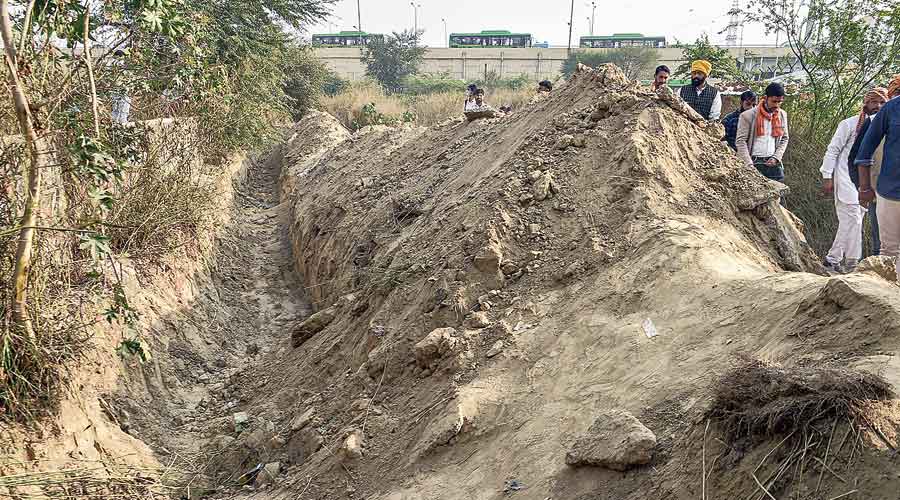Protesting farmers have compared the government’s fortification of Delhi with the fencing along the borders with Pakistan and China and signalled their resolve to continue with the movement with increased vigour.
As the Kisan Ekta Morcha’s “FencingLikeChinaPak” hashtag dominated social media, the farmers’ mahapanchayats in Punjab, Haryana and western Uttar Pradesh in support of the peasants picketing Delhi’s borders have been drawing massive crowds.
Rakesh Tikait, the Bharatiya Kisan Union (Tikait) leader who has become a rallying point of the farmers’ movement, is slated to attend a mahapanchayat at Kandela village in Jind district of Haryana on Wednesday. The Kandela khap is one of the prominent social structures of the state and this village was the first to send out tractors on January 28 after Tikait refused to court arrest and broke down, upset with two BJP legislators joining a mob that was planning to attack the protest site at Ghazipur.
Tikait, who hails from Muzaffarnagar district of western Uttar Pradesh that has been pro-BJP since the riots of 2013, has time and again expressed disappointment over the manner in which the Yogi Adityanath government has treated farmers since the protests began — blocking their movement towards Delhi and filing cases galore against them.
On Tuesday, Tikait announced that the farmers’ agitation could continue till October if need be, extending the earlier timeline that Punjab farmers had been suggesting. Given that their next crop harvest is in April, Punjab and Haryana farmers had moved to Delhi in November prepared with rations for a six-month haul.
Speaking to reporters in Ghazipur after Shiv Sena Rajya Sabha MP Sanjay Raut called on him at the protest site, Tikait said: “Our slogan is — ‘kanoon wapsi nahi, toh ghar wapsi nahi (Without repeal of the laws, we will not return home)’.”
With Ghazipur becoming the big draw for farmers with even the Punjab-based Bharatiya Kisan Union-Ekta (Ugrahan) group heading there through alternative routes as the main highway from Delhi has been blocked off with multi-level barricades, the police are now digging up side roads. Accessing Singhu and Tikri has also been made practically impossible for even journalists from Delhi as part of a strategy to blackout the information flow that has not stopped despite the Internet shutdown that was extended for another 24 hours on Tuesday.

Commuters pass through an unmetalled path on Tuesday to cross the Singhu border where road blockades have been put up by security personnel PTI
The Narendra Modi government informed the Lok Sabha on Tuesday that it would not pay compensation to the farmers who have died during the protest that has been going on in Punjab since June and along Delhi’s borders since November 26. Replying to a question jointly put by 28 MPs from various political parties on whether the government proposes to give compensation to the families of the farmers who have died during the agitation, agriculture minister Narendra Singh Tomar said in a written reply: “No Sir.”
Tomar, who led the government’s interlocutors during the 11 rounds of negotiations with the farmers, had along with the other ministers observed a minute’s silence with union leaders in one of the meetings in memory of those who had died.
The legal team set up by the Samyukta Kisan Morcha to help the farmers arrested during the chaos at the tractor rally on Republic Day met Delhi chief minister Arvind Kejriwal and secured from him an assurance that those imprisoned in Tihar jail would be taken care of well as prisons come under the Delhi government. As for the cases, Kejriwal is said to have told the delegation that he has no say as the Delhi police force comes under the Centre. In all, 115 farmers are in prison while about 29 are said to be missing since January 26.
The All India Kisan Sangharsh Coordination Committee (AIKSCC), which had given the call for a “Dilli Chalo” march on November 26 and 27, has decided to conduct a weeklong village outreach from Wednesday to apprise farmers about the repression of the protest by the government.
“If the farmers’ movement fails, then this kind of repressing and barricading that we are seeing at Ghazipur, Singhu and Tikri could become the template, the new normal, for all protests,” said P. Krishnaprasad of the All India Kisan Sabha, a constituent of the AIKSCC.
With support for the farmers’ movement growing, the smaller sites of protest that had been vacated in the wake of the events of January 26 have once again been occupied by the peasants, the latest being Palwal on the Delhi-Agra highway.











